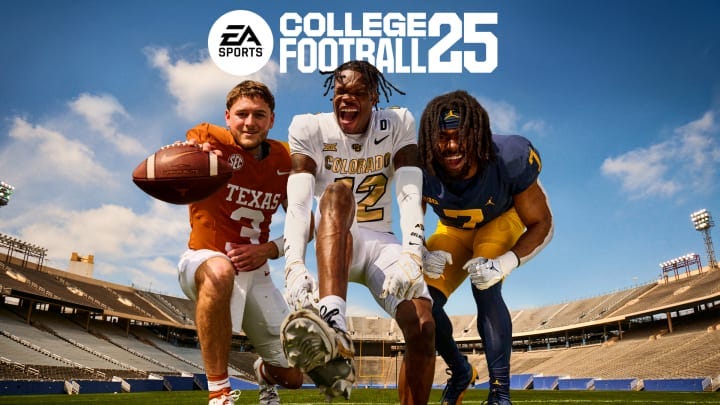The Game (2009)
The return of a college football institution...and the overhaul of college football itself.
This is Throwbacks, a newsletter by me, Michael Weinreb, about sports, history, culture and politics, and everything in-between.
If you like what you read, please click the button below, join the mailing list for FREE and share, on social media or through e-mail or however you feel comfortable sharing. And if you’ve been reading for a while, please consider a paid subscription to keep this thing going.
I.
I don’t write about college football as much as I used to, in part because I’ve said a lot of what I’ve had to say about its past, and in part because I’m not really sure what to say about a future that seems to grow more complicated by the day. I’ve largely been hiding away from it this offseason, ensconced in a soundproof bunker of my own making. Just this week, the two remaining teams in the conference formerly (and yet somehow still) known as the Pac-12 agreed to a television deal with the network that brought us Gossip Girl; meanwhile, the Atlantic Coast Conference is in the midst of an acrimonious legal spat that seems driven entirely by institutional egos, and the NCAA, besieged by lawsuits, still has no real idea what might happen next with the entire apparatus that they are technically charged with overseeing.
There is no easy way to process all of this without feeling a certain level of disgust. But there is also good news: Yesterday, EA Sports announced a July 19th release date for its newest college football video game, a decade after they discontinued it in the wake of a class-action lawsuit fronted by a journeyman college quarterback named Sam Keller.
It is my hope that this means the first threads of the new normal are setting in. And as we slowly emerge from our bunkers and survey the wreckage, it is not unreasonable to argue that Sam Keller, Most Valuable Player of the 2004 Sun Bowl, currently working in the liquor business in Scottsdale, Arizona, is the most impactful college football player of the 21st century.
II.
Fifteen years ago this month, Sam Keller became the headline plaintiff in a class-action lawsuit against the NCAA and EA Sports, the company that produced the NCAA Football, which had essentially come to define my relationship with one of my closest friends. I thought about the Game constantly; I literally dreamed about the Game. (Over the years, I found every excuse to continue writing and thinking about the Game, and I was not alone.) The Game’s demise left a void in my life, even as I understood that Keller was entirely in the right.
We all knew what was happening here: While NCAA Football referred to its players only by number and position (i.e., QB #12), their vital statistics, abilities, and appearances correspond so closely with real life that it would be an indefensible fib to contend otherwise.
Of course, certain zealots despised Sam Keller for what he did. They deemed him selfish for having the audacity to call out a corporation for absconding with his own name, image and likeness and refusing to compensate him. They pummeled him with insults and threats and labeled him a Judas. All they knew is that the Game was gone—a Game that most college football players themselves admitted to loving—and Keller was the scapegoat. They were not willing to consider the long-term ramifications here, because when something this cool is wrenched from your grasp, who’s thinking a decade ahead? Why, these zealots wondered, couldn’t we just continue to wink and nudge and live the lie?
But Sam Keller knew precisely what he was doing. He wanted to change the system. And what’s perhaps most remarkable is that he actually did it.
“It's pretty neat that we knocked over the first domino,” Keller told AZCentral in 2019. “That's something you can't take away. Most people couldn't see the big picture, but here we are and this is why we did it. That's the most gratifying part, for all the future student-athletes to come and how they can benefit. That was the end goal.”
III.
It is kind of weird to think that a spat over a video game could completely alter an American institution, but this is the power of the Game: It was a pseudo-realistic simulation, and yet it was couched in our own complete denial of reality. In other words, it was an encapsulation of everything that made college football great, and everything that made it problematic.
That contradiction was what made this sport so uniquely American. We want so badly to believe in our own national exceptionalism that a certain segment of the population has actually backed itself into its own pseudo-reality, fronted by the archetypal charlatan who created that reality. They would rather continue to believe the lie than confront the ramifications of the lie.
It’s difficult for me to think too hard about college football right now, because the changes make my head hurt. But there’s comfort in knowing that the Game is back. All it took was a few hundred dollars in compensation for each player, and a complete overhaul of a system that had been exploiting its workforce for decades. It’s not easy to accept how much has changed over the course of a single decade, but they couldn’t take it away from us forever. All we had to do is acknowledge that we were lying to ourselves all along.
This newsletter is a perpetual work in progress. Thoughts? Ideas for future editions? Reply directly to this newsletter, contact me via twitter or at michaeliweinreb at gmail, or leave a comment below. If you enjoyed this newsletter, please join the list and share it with others or consider a paid subscription.


